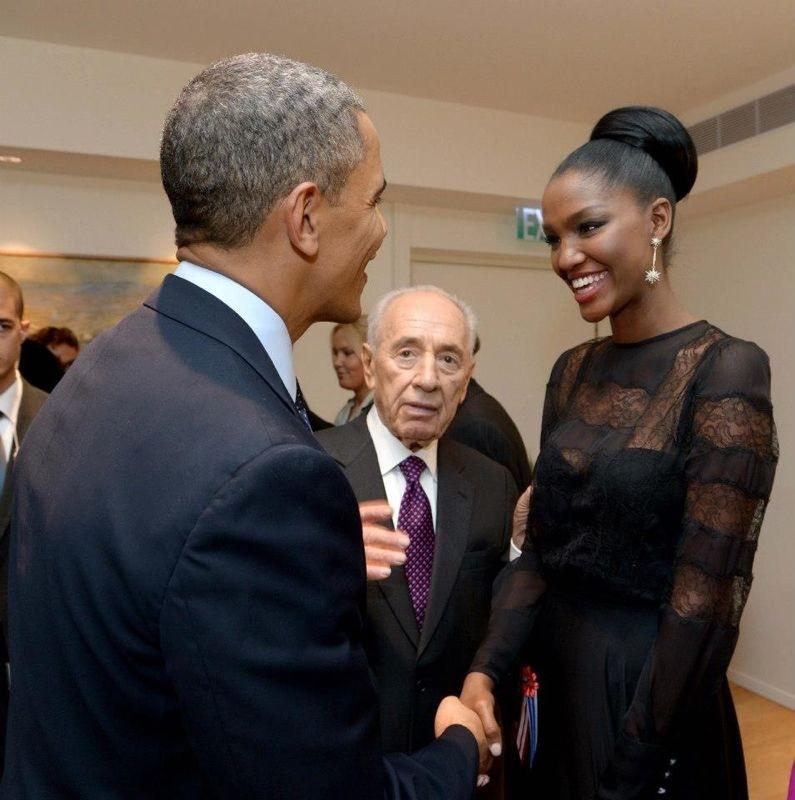I met Yityish (Titi) Aynaw at the 2013 Miss Israel Beauty Pageant auditions, when she was rocking an afro and smoking a cigarette outside. I was drawn to the aura of coolness that surrounded her — the way she leaned against the wall, the way her jeans hung effortlessly on her body, the way she said whatever she was thinking — like nothing could bother her or push her off-center.
I could never have guessed that she’d grown up in the small Jewish village of Chahawit in Ethiopia, that her father passed away when she was a baby and her mother died of a terrible illness when Titi was only 12. I didn’t know that after her mother’s death, she’d made aliyah to Israel with her brother and moved in with her grandparents, that she had to adapt to a completely new environment, new language, new culture. All I knew was that there was something about Titi, about the way she carried herself: star power.
She and I had an immediate connection, spending the first month of the beauty pageant competition laughing at how ridiculous we looked prancing around in six-inch heels and a string bikini. We brushed aside the fact that we were constantly being judged for our looks and shrugged at the ridiculous rule of having to wear heels to every pageant meeting, even if that meeting was literally on the sandy beaches of Tel Aviv. Instead, we tried to enjoy our newfound privilege, tilting our heads back in laughter as club owners let us cut the lines, as the hottest restaurants somehow always had a table waiting for us, as heads turned and people whispered everywhere we went.

While my 15 minutes of pageant fame didn’t last, Titi went on to win the entire competition. The little girl with a big dream suddenly became the first Ethiopian immigrant to win the Miss Israel title. Yet what I still didn’t know was that while Titi and I experienced the beauty pageant together, the tokenism and racism she was exposed to as an Ethiopian woman in Israel is an experience she faced alone.
Recently, I caught up with my friend Titi to talk about her experience back then and the work she’s still doing to advocate for Ethiopian Israelis.
This interview has been translated from Hebrew to English, and lightly edited for clarity.
What has been one of the most influential moments in your life since becoming the first Ethiopian Miss Israel?
I have to say meeting Barack Obama. You’ll never believe what happened before I met him, though. A Washington D.C. number called me and the woman on the line told me that Barack Obama was coming to Israel and wanted to invite me to dinner. I was absolutely 100% sure my friends were playing a prank on me, so I HUNG UP on her. I hung up on the White House! Two days later, the woman called my manager, who called me, and I realized that I had made a huge mistake and that they weren’t kidding. When I met Obama at that dinner, he told me he wished Michelle was there to meet me, too. Oh, and he asked me how high my heels were.

Have you experienced racial discrimination and tokenism as an Ethiopian woman in Israel?
I know racism and tokenism exist in Israel. I’m not here to complain about it, I’m here to change it. When I won the pageant title, there were a lot of people that were really happy to see a Black woman, an Ethiopian immigrant, on the cover of magazines representing and changing the standard of beauty in Israel. But there were also people that didn’t support my win. I don’t know why, honestly. Israel has so many immigrants — Russians, Arabs, Moroccans, Yemenis, Ethiopians — we’re so lucky to have so much diversity, so why be bitter about it, you know?
Life is hard for Ethiopians in Israel, but not in a sad way. We know how to get what we want and we stand up for what we believe in. I hope that 20 years from now, we won’t even have to ask questions about racism because it just won’t exist.
Have you always wanted to be Miss Israel?
It’s a funny story, actually. When I moved to Israel, my first friend, the first girl to ever ask me if I wanted to sit next to her, told me that she was going to sign me up for the Miss Israel beauty pageant. “One day, I’m going to sign you up and you’re going to win,” she said. I never thought I would win. That was in 2004. Nine years later, that dream became a reality.

What is your dream, now?
On a personal level, I want to build a home in Israel, get married, have children. Professionally, I want to continue to represent and help Ethiopians in Israel. The Black Lives Matter protests in the United States have pushed me to think of ways I can do more. I’m building a website for Ethiopians in Israel that gives them a voice and a place to connect to other Ethiopians looking for jobs and advice. I want to interview important Ethiopian people and give them the recognition they deserve.
Do you think the Black Lives Matter protests in the United States have the potential to affect Israel and change the racism and tokenism that exist today?
Absolutely. I am a huge supporter of Black Lives Matter. We were all made to be different — different colors, different sizes, different religions — in order to make the world more interesting. I think that every person on the face of this earth needs to be part of the Black Lives Matter movement. We can’t let history repeat itself. We need to feel free, to live freely, and we shouldn’t be scared to live and speak and act because of the color of our skin. We can’t just talk, we need to do.
With the global pandemic that’s changing the world, there’s just no room for racism or poison or ignorance, not ever, and especially not right now. Nobody has time for that.
So what’s next for Titi?
Aside from my website, my next project is to help raise money for people in need. Because of coronavirus, people are going to sleep hungry. I’m so thankful to be able to take care of myself and my family, but I know what it’s like to not be able to do that. I still feel other people’s pain on a personal level, and I will use my platform and privilege as an Ethiopian woman in Israel to do whatever I can to help others.
All images courtesy author.



